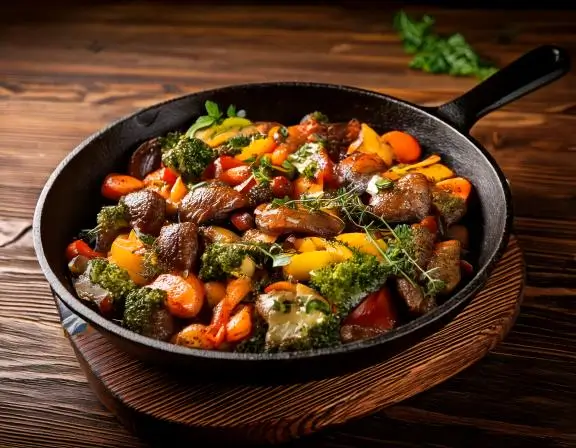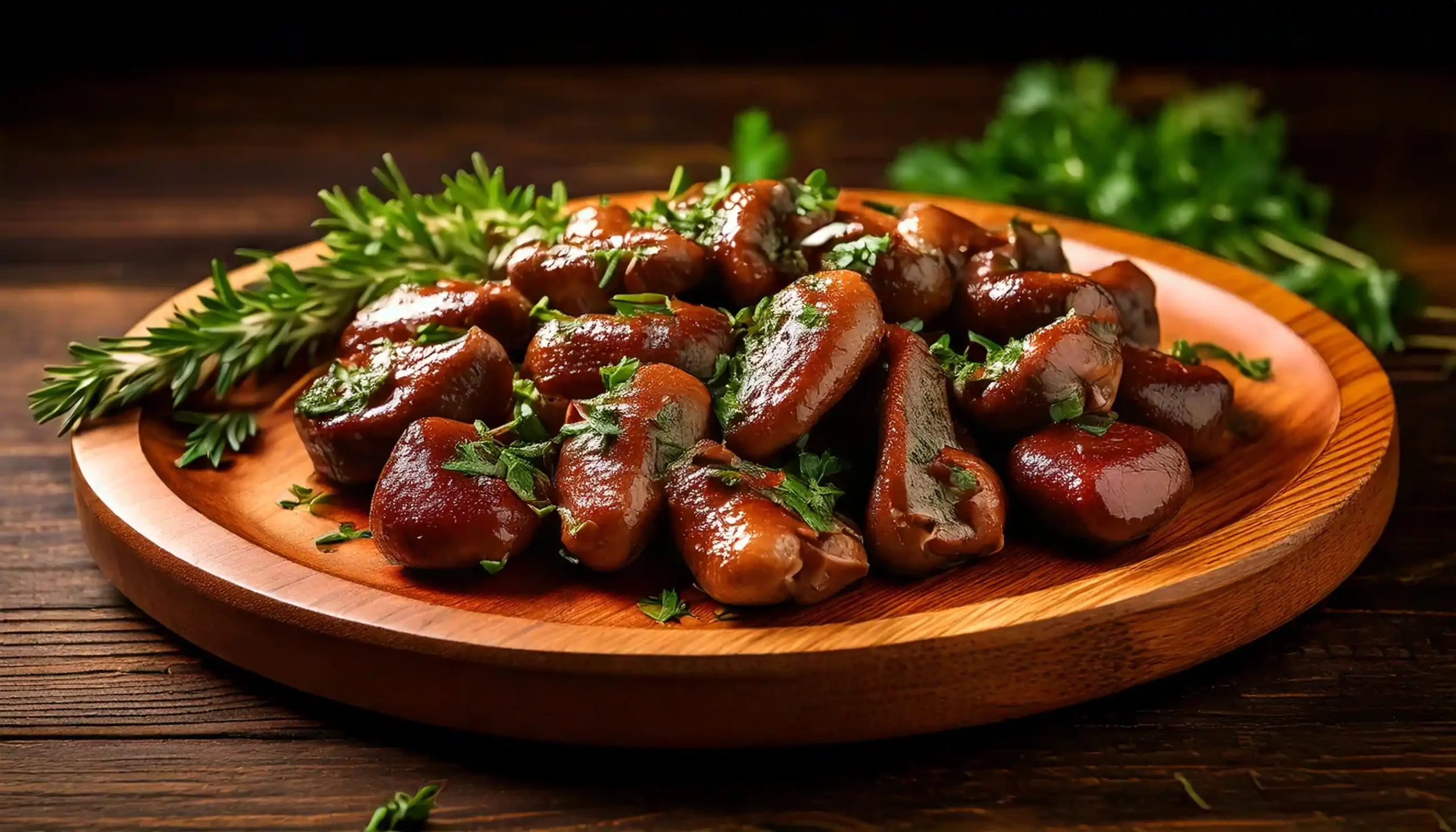Are Chicken Hearts Good for You? Chicken hearts might not be the first ingredient that comes to mind when planning a meal, but they’re a nutrient-packed, protein-rich food enjoyed in many cuisines worldwide. In this article, we’ll explore whether These hearts are good for you, their health benefits, potential concerns, and how to prepare them in delicious recipes. You’ll also learn about their nutritional value, making it easier to incorporate this often-overlooked food into your diet.
Introduction to Chicken Hearts
Chicken hearts, a type of organ meat, are small, lean, and packed with essential nutrients. Popular in traditional dishes from Brazil to Southeast Asia, these nutrient-dense morsels have gained popularity among health-conscious food lovers. But what exactly makes them so beneficial?
What Are Chicken Hearts?
Chicken hearts are the muscular organs responsible for pumping blood in chickens. Though small in size, they deliver a big punch of protein, vitamins, and minerals, making them a staple in many global recipes. They’re often grilled, fried, or added to stews for a rich, savory flavor.
Why Are People Curious About Chicken Hearts?
In recent years, the growing interest in nutrient-dense and sustainable food sources has led many to reconsider chicken hearts. With a unique texture and bold taste, they offer a healthy, budget-friendly protein option for adventurous eaters and health enthusiasts alike.
Global Culinary Tradition
From Brazilian churrasco skewers to hearty Eastern European stews, chicken hearts have earned a spot in various culinary traditions. Their rich, meaty flavor and nutritional profile make them a versatile ingredient in many recipes.
Health Benefits of Chicken Hearts

Chicken hearts are more than just a unique culinary ingredient—they’re nutritional powerhouses. Packed with essential vitamins, minerals, and proteins, they support a range of bodily functions. Let’s dive into the impressive health benefits of these often-overlooked morsels.
High Protein Content for Muscle Growth
When it comes to building lean muscle, protein is essential, and chicken hearts deliver it in abundance. These organ meats are loaded with essential amino acids, the building blocks of protein that our bodies can’t produce on their own.
For athletes and fitness enthusiasts, incorporating chicken hearts into meals supports muscle repair and growth after intense workouts. The high protein content helps maintain muscle mass, making them a valuable part of a balanced, protein-rich diet.
Rich in Essential Nutrients
Chicken hearts aren’t just about protein—they’re packed with iron, zinc, and B vitamins, essential for maintaining overall health:
- Iron for Preventing Anemia: Chicken hearts provide a significant amount of heme iron, which is easily absorbed by the body. This helps prevent anemia, reducing symptoms like fatigue and dizziness.
- Zinc for Immune Support: Zinc strengthens the immune system and helps fight off infections. Consuming chicken hearts regularly can contribute to maintaining a strong immune defense.
- B Vitamins for Energy Production: Chicken hearts are an excellent source of B vitamins, particularly B12 and B6. These nutrients play a crucial role in converting food into energy, keeping you energized throughout the day.
Boosting Heart and Brain Health
Surprisingly, chicken hearts support heart health despite their somewhat intimidating name. They contain small amounts of omega-3 fatty acids, known to improve cardiovascular function by reducing inflammation and supporting healthy cholesterol levels.
Additionally, the B vitamins found in chicken hearts assist in producing neurotransmitters essential for cognitive function. This supports better memory, mood regulation, and overall brain health.
Enhancing Energy Levels
Feeling drained and fatigued? Chicken hearts can help restore energy thanks to their high levels of iron and vitamin B12. These nutrients play vital roles in the production of red blood cells, which transport oxygen throughout the body, combating tiredness and boosting endurance.
Potential Health Concerns
While chicken hearts offer numerous health benefits, they also come with certain considerations. Knowing these potential concerns helps ensure a balanced and safe diet.
Cholesterol Content in Chicken Hearts
One of the most frequently discussed concerns about chicken hearts is their cholesterol content. Since organ meats tend to be higher in cholesterol than lean cuts of meat, individuals watching their cholesterol levels should be mindful of portion sizes.
- Cholesterol Levels Explained: A 100-gram serving of chicken hearts contains about 242 mg of cholesterol, which is significant considering the daily recommended limit of 300 mg for healthy individuals.
- How to Manage Portion Size: Eating chicken hearts occasionally and pairing them with fiber-rich vegetables can help balance cholesterol intake. Cooking methods like grilling or baking can further reduce added fats from oils or sauces.
Sodium and Preservative Concerns
Processed versions of chicken hearts may contain added sodium and preservatives, which can be harmful when consumed in excess.
- Risks from Processed Chicken Hearts: Pre-packaged chicken hearts can be preserved with high-sodium solutions or chemical preservatives, raising concerns about high blood pressure and other health issues.
- Choosing Fresh Options: Whenever possible, purchase fresh or frozen chicken hearts from trusted sources. Opt for minimally processed products with no added preservatives for a healthier meal.
Allergic Reactions and Food Sensitivities
Although rare, some individuals may experience allergic reactions or food sensitivities to chicken hearts.
- Potential Allergies: Symptoms such as itching, swelling, or digestive discomfort may indicate a sensitivity to organ meats. If unsure, introduce chicken hearts in small amounts and monitor any reactions.
- Consulting a Healthcare Provider: Those with existing food allergies should consult a healthcare professional before adding organ meats to their diet.
How to Include Chicken Hearts in Your Diet

Incorporating chicken hearts into your meals can be both nutritious and delicious. With versatile cooking methods and traditional recipes from around the world, they can become a flavorful staple in your diet.
Cooking Methods for Maximum Nutrition
Cooking chicken hearts the right way can preserve their nutrients while enhancing their rich, savory flavor. Here are some effective methods:
- Grilling: Marinate chicken hearts with olive oil, garlic, and spices before grilling them on skewers. This method locks in the natural juices while adding a smoky, charred taste.
- Pan-Frying: Heat a bit of oil in a skillet and quickly sear chicken hearts over medium-high heat. This method gives them a crispy exterior while keeping the inside tender.
- Baking: Season the hearts with herbs and bake them at 375°F (190°C) for about 25-30 minutes. Baking is a healthy, hands-off method that requires minimal oil.
Traditional Recipes from Various Cuisines:
- Brazilian Churrasco: Skewered and grilled chicken hearts are a classic at Brazilian steakhouses.
- Japanese Yakitori: Seasoned chicken hearts grilled over hot coals make for a savory Japanese delicacy.
- Eastern European Stews: Slow-cooked chicken hearts add richness and depth to hearty stews.
Tasty Recipes Using This Nutritious Ingredient
Looking for recipe inspiration? Try these popular chicken heart dishes:
- Chicken Heart Skewers: Marinate in soy sauce, garlic, and ginger, then grill or broil for a flavorful, protein-packed appetizer.
- Hearty Stew: Simmer chicken hearts with potatoes, carrots, onions, and spices for a comforting, nutrient-rich meal.
- Chicken Heart Salad: Sauté hearts with onions and toss them into a mixed green salad with a tangy vinaigrette.
Where to Buy and Storage Tips
- Best Places to Purchase: Look for Poultry hearts in the meat section of grocery stores, butcher shops, or online meat suppliers specializing in organ meats. Choose products labeled “fresh” or “organic” for higher quality.
- Proper Storage Methods: Store fresh Poultry hearts in the refrigerator and use them within 1-2 days. For longer storage, freeze them in airtight containers or freezer bags for up to 3 months. Thaw safely in the fridge before cooking.
FAQs Related To “Are Chicken Hearts Good for You?“
To clear up common questions about These hearts, here are well-researched answers based on frequently asked questions from Google’s “People Also Ask” section.
Is Chicken Heart Good or Bad for You?
These hearts are undeniably good for you when consumed in moderation. They are high in protein, iron, zinc, and B vitamins, supporting energy production, immune function, and muscle growth. However, they contain cholesterol, so portion control is essential, especially for those monitoring their heart health.
Eating These hearts occasionally as part of a balanced diet can be a delicious way to boost nutritional intake without compromising on taste. Pair them with vegetables and whole grains for a well-rounded meal.
Are Chicken Hearts a Superfood?
While not officially labeled as a “superfood,” Poultry hearts are incredibly nutrient-dense, providing an impressive combination of essential vitamins and minerals. Their iron, vitamin B12, and zinc content make them comparable to popular superfoods like spinach or quinoa.
Given their high nutrient-to-calorie ratio, These hearts support energy production, immune function, and muscle maintenance, making them a worthy addition to a nutrient-rich diet.
Is Chicken Heart Better Than Breast?
Both chicken heart and chicken breasts have unique nutritional advantages:
- Chicken Heart: Higher in iron, zinc, B vitamins, and collagen, making them ideal for energy production, skin health, and immune support.
- Chicken Breast: A leaner cut with less fat and cholesterol but still a rich source of protein.
Choosing between them depends on your nutritional goals. These hearts provide more vitamins and minerals, while chicken breasts are better for low-fat, high-protein diets.
Is Chicken Heart Better Than Liver?
Chicken hearts and chicken livers each offer unique health benefits:
- Chicken Hearts: Higher in protein and iron, with a meatier texture and milder taste. They are an excellent source of vitamin B12 and zinc.
- Chicken Liver: Richer in vitamin A, folate, and copper, supporting vision, skin health, and red blood cell production.
If you’re after a milder flavor and a protein-rich meal, These hearts might be the better choice. However, for maximum vitamin A and overall micronutrient diversity, chicken liver is hard to beat.
Conclusion and Final Thoughts
Chicken heart may not be a common ingredient in every kitchen, but their nutritional value, rich flavor, and affordability make them a smart addition to a balanced diet. They provide essential nutrients like iron, zinc, B vitamins, and protein, supporting energy production, muscle growth, and immune function.
However, it’s crucial to keep portion sizes in check due to their cholesterol content and choose fresh, minimally processed products to avoid unnecessary sodium or preservatives. When prepared correctly, These hearts can become a delicious, nutrient-dense protein source for various meals.
If you’re adventurous with your cooking, try incorporating Organ meat into recipes like skewers, stews, or salads. With diverse preparation methods like grilling, pan-frying, and baking, the possibilities are endless.
Whether you’re searching for a new protein source or curious about expanding your palate, Organ meat offer a unique blend of taste and nutrition. They might just become your next favorite ingredient!

